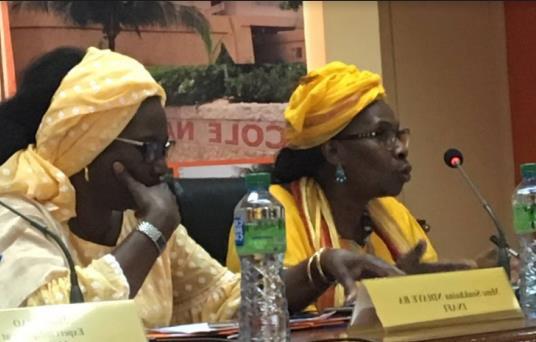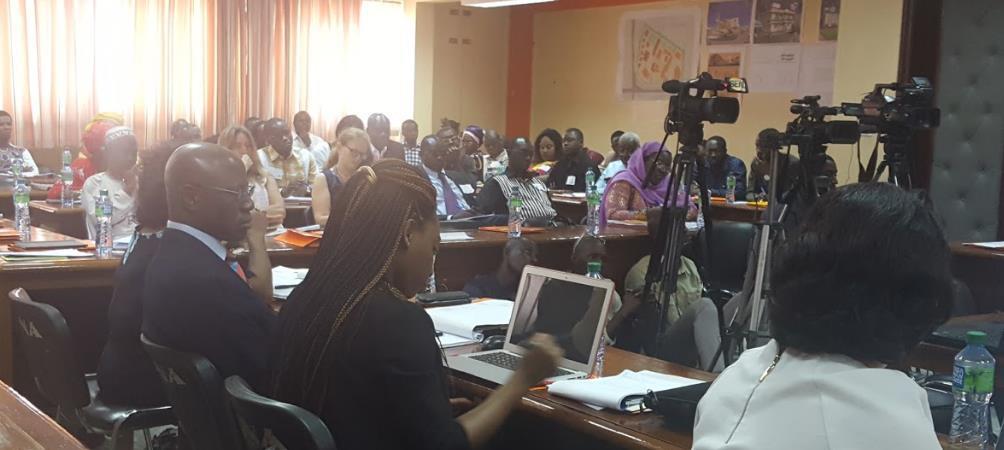MULTI-STAKEHOLDERS MEETINGS
Multi stakeholder meetings have been organized as part of the MADE West Africa project to involve relevant local, national and regional actors, promote synergies and share good practices. The goal is:
- to create a space of dialogue and advocacy between representatives of the civil society and public authorities.
- to provide an opportunity to identify existing legislative, institutional, practical good practices and policy barriers to diaspora involvement for development in order to establish a roadmap.
Ghana
On 10th & 11th July 2017, AFFORD held a multi-stakeholder meeting in Accra to enhance the role of the Ghanaian diaspora in development and job creation. 69 people attended this event including Ghanaian Government officials, civil servants, diaspora stakeholders, private sector businesses, local CSO. The participants at the multi-stakeholder meeting brainstormed on the following key points of reflexion:
- The difference of impact between individual versus collective remittances
- The importance to think through clearly how much more diaspora organisations can do together – demonstrate impact, achieve scale, evidence work, etc.
- Important to have a scope for working together if diaspora organisations want to engage with institutions, policy makers etc.
- The necessity to research and learn from other relevant diaspora examples
They also formulated among others the following recommendations:
For the Ghanaian government:
- Include a Diaspora Engagement Policy in the National Policy Strategic Framework.
- Develop local programs and services by municipal, metropolitan and district local assemblies that complement and engage with the ones develop at national level. This can only strengthen the contribution of migration to development by reinforcing its local relevance and impact to development.
For diaspora stakeholder:
- Develop a diaspora and migrants resource centre with relevant materials such as a Development Resource Guide to serve as a link with other local social and economic development programs, projects, activities and initiatives; develop access to information and reflexion on best case practices.
- Increase advocacy capabilities through capacity building exercises for the diaspora and representatives of national and local communities.
- Capacity building of diaspora organisations in areas such as policy advocacy, fundraising, project implementation and management, monitoring and evaluation.
- Multi-stakeholder meeting report
A second Multi-stakeholder meeting was held by AFFORD from the 20 to the 25th of May 2019 in Accra, Ghana.
Further details and report of the event will be soon available.
Burkina Faso and Togo :
 On May 15-16 2017, FORIM organised a 2-day multi-stakeholder meeting in Dakar common to both target countries and including a regional dimension. The meeting gathered 100 participants from Burkina Faso, France, Ghana, Guinea, Mali, Morocco, Senegal, and Togo. The meeting gave Burkinabe and Togolese participants an overview of the ways to engage diaspora in development in other African countries (good practices and limitations).
On May 15-16 2017, FORIM organised a 2-day multi-stakeholder meeting in Dakar common to both target countries and including a regional dimension. The meeting gathered 100 participants from Burkina Faso, France, Ghana, Guinea, Mali, Morocco, Senegal, and Togo. The meeting gave Burkinabe and Togolese participants an overview of the ways to engage diaspora in development in other African countries (good practices and limitations).
Some main points were discussed and highlighted, notably:
-
- Information and communication towards the diaspora by governmental authorities;
- Social and Solidarity Economy as a path to engage Diaspora for job creation in their countries of origin;
- The shift of paradigm and practices brought by the generational shift as well as the mechanisms to be put in place to respond to this issue;
- The climate of collaboration between state, diaspora and local civil society;
- The involvement of diasporas in the governance of countries of origin and the definition of national strategies for better mobilization in implementation;
- The role of the Migration Dialogue for West Africa (MIDWA) and the establishment of national spaces for dialogue and the inclusion in these dialogues of the theme "Diaspora and development";
- Mobility issues and their implications for the mobilisation of diasporas
Videos from the event:
Participants formulated among others the following recommendations:
- Address the issue of mobility between Africa and Europe and within the ECOWAS where some countries do not open their borders and do not respect the agreement
- Highlight the link between participation in governance and participation in the implementation of policies so that diasporas find their place in the institutions of countries of origin
- Give publicity to the initiatives of migrants, in particular the possible partnerships with the public authorities of host and origin countries, as well as support mechanisms and structures.

 On May 15-16 2017, FORIM organised a 2-day multi-stakeholder meeting in Dakar common to both target countries and including a regional dimension. The meeting gathered 100 participants from Burkina Faso, France, Ghana, Guinea, Mali, Morocco, Senegal, and Togo. The meeting gave Burkinabe and Togolese participants an overview of the ways to engage diaspora in development in other African countries (good practices and limitations).
On May 15-16 2017, FORIM organised a 2-day multi-stakeholder meeting in Dakar common to both target countries and including a regional dimension. The meeting gathered 100 participants from Burkina Faso, France, Ghana, Guinea, Mali, Morocco, Senegal, and Togo. The meeting gave Burkinabe and Togolese participants an overview of the ways to engage diaspora in development in other African countries (good practices and limitations).